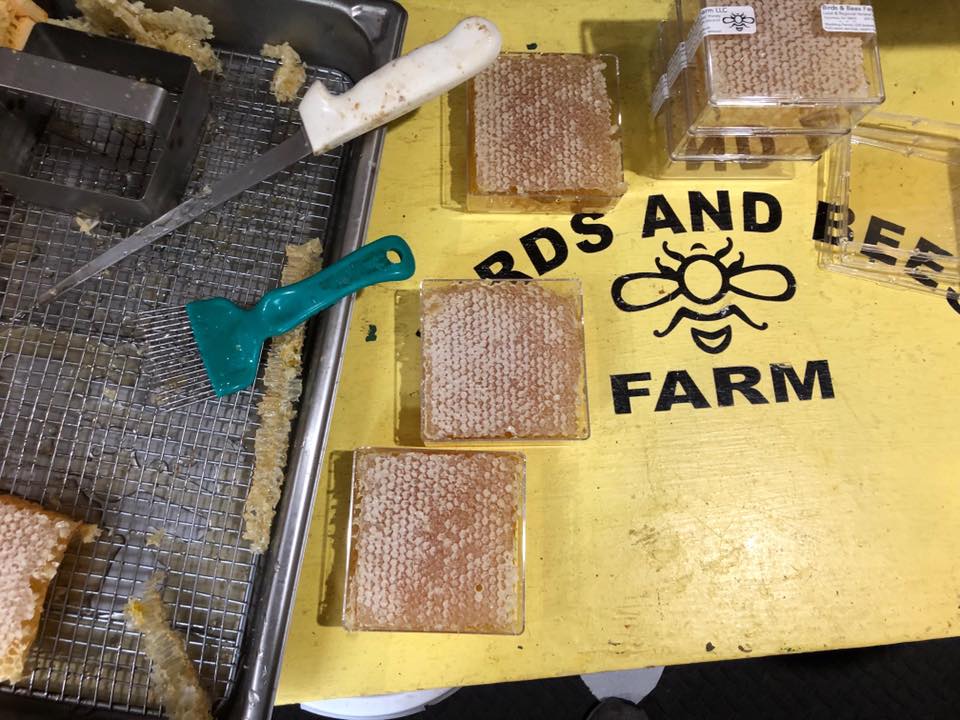
Birds and Bees Farm was founded in 2007, when my 75-year-old father-in-law, found a colony of bees in an outbuilding on the family farm. He didn’t want to hurt the bees and asked if I knew anything about removing honeybees. I knew nothing about honeybees, so I contacted the NJ Beekeepers Association and spoke with the club President at that time. He was able to tell me what equipment was needed, and even came over and helped me cut out the beehive. Well, this was my first hive and I became hooked. One hive became two, and two became six, and now we are up to almost 200 hives at times.
We are a family-owned apiary, working hives in Burlington, Monmouth, and Mercer Counties this year. Our honey is extracted here in Columbus, NJ and is always raw and unpasteurized. We are a small enough operation not to require heating our honey to pump it to our bottling tanks. We strain, never filter our honey, retaining all of nature’s beneficial pollens, wax, propolis, minerals, and enzymes, in a pure and wholesome product! This is nature’s finest natural sweetener available; nothing added nor taken away in the extraction process.
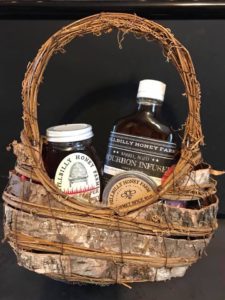 Our farm also offers many additional interesting hive products such as raw beeswax, beeswax candles, and ornaments. Cut comb honey squares as well as tasty regional varietal honey from across the US is also available at our farm. We keep very busy, trying to find new products to offer and remain competitive. We have many honey products that are “fan favorites” that include our lavender-infused, ghost pepper, bourbon-infused, and our creamed and cut comb products.
Our farm also offers many additional interesting hive products such as raw beeswax, beeswax candles, and ornaments. Cut comb honey squares as well as tasty regional varietal honey from across the US is also available at our farm. We keep very busy, trying to find new products to offer and remain competitive. We have many honey products that are “fan favorites” that include our lavender-infused, ghost pepper, bourbon-infused, and our creamed and cut comb products.
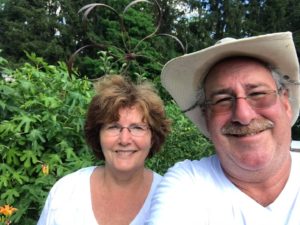 I am a full-time beekeeper, with my wife, Debbie, and daughter-in-law helping to bottle and do the bookkeeping. They also deliver orders and Debbie helps with the bees as well, when she is not working her full-time job off the farm at the New Jersey Farm Bureau, a non-profit organization that advocates for our farmers with legislative issues.
I am a full-time beekeeper, with my wife, Debbie, and daughter-in-law helping to bottle and do the bookkeeping. They also deliver orders and Debbie helps with the bees as well, when she is not working her full-time job off the farm at the New Jersey Farm Bureau, a non-profit organization that advocates for our farmers with legislative issues.
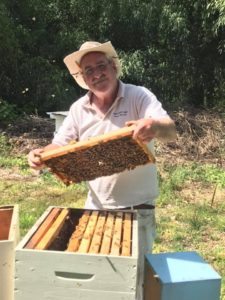 We raise our bees for gentle behavior and pride ourselves in having gentle bees that don’t require me to wear a bee suit when I work my bees. It is important to us to keep our hives in various locations to protect against disease and possible spraying or other environmental factors that might adversely affect the colonies. In our home yard, I keep mostly nuc colonies and raise queens from our strong colonies. It is easier for me to check the smaller colonies (Nucs) and keep better control of the laying patterns and health of the queens.
We raise our bees for gentle behavior and pride ourselves in having gentle bees that don’t require me to wear a bee suit when I work my bees. It is important to us to keep our hives in various locations to protect against disease and possible spraying or other environmental factors that might adversely affect the colonies. In our home yard, I keep mostly nuc colonies and raise queens from our strong colonies. It is easier for me to check the smaller colonies (Nucs) and keep better control of the laying patterns and health of the queens.
Two years ago, we purchased a 16-acre farm near our home, and are busy improving the soil, the fields, and water access for the bees. It has been quite a job, more than we had ever imagined, but seeing the meadows filled with color from the pollinator plants and native vegetation come back to life each year is encouraging. We have milkweeds, thistles, bee balms, coneflowers, black-eyed susan, queen anne’s lace, coreopsis, clover, goldenrod, and many other plants that the bees are working and enjoying. The natural habitat has made some great honey! We pulled about 1000 pounds of beautiful light honey so far this summer from 40 colonies on that property. The goldenrod and fall foliage will provide us with some darker fall honey which we will pull near the end of September.
We are gearing up to streamline our honey harvesting and extracting procedures, and palletizing hives for less labor. We have just completed a new barn on our property, that we can now store more inventory including bottles, hive boxes, and inventory of honey. We made a special “hot room” with heated floors to keep our honey from granulating during the winter months, as we sell our honey to retail locations and our self-serve customers year-round.
Another bee yard that has been successful for our bees is along the Delaware River. This farm grows cantaloupes, honeydew melons, sweet potatoes, sweet corn, and other vegetables and cut flowers. There is a different environment along the Delaware, with plants that love the wetter soil such as knotweed. In the fall, the first year there, we opened the hives to find very dark, almost black supers filled with honey, and we weren’t sure what we had. I talked to the farmer, and we walked down the fields and discovered knotweed growing all along the river’s edge. It was delicious honey and we look forward to this fall honey every year. Another plus from this farm is their honeydew and melon honey we get to harvest in the summer. It is creamy and light in color, and a fantastic honey to cook with, have on toast, and include in your favorite recipe. This melon honey always sells out before the end of the year!
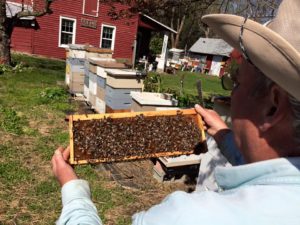 We want to focus on our development of raising Jersey-bred queen bees for local beekeepers, and why it is also important to buy locally bred bees. We want to sell “proven” queens, that is queens that have been hatched, mated, and then laying eggs long enough to see her laying pattern on the comb, and if she and her offspring are exhibiting those quality behaviors we are specifically breeding for. We select stock from certain hives that exhibit specific positive characteristics.
We want to focus on our development of raising Jersey-bred queen bees for local beekeepers, and why it is also important to buy locally bred bees. We want to sell “proven” queens, that is queens that have been hatched, mated, and then laying eggs long enough to see her laying pattern on the comb, and if she and her offspring are exhibiting those quality behaviors we are specifically breeding for. We select stock from certain hives that exhibit specific positive characteristics.
As a beekeeper, we can control the quality of the queen, from the egg to the egg layer. We can breed for gentleness, cleanliness, productivity of pollen and nectar collecting, survivability from Varroa mites and disease, overwintering, food consumption, etc. These are just a few traits to consider. We can also control to a large degree, which drones she will mate with by allowing only the drones from the best colonies to exit the hives and mate with the queens, as she goes about her week or so of mating flights. We use front entrance hive excluders to disallow any drones from sub-par hives, from exiting and mating.
By selecting the stock of the Mother (queen) and Drones, you can stack the deck in your favor by producing better quality colonies, gentler bees, and better honey production. Buying queens from mass-produced suppliers has always been a crapshoot and a disappointment for me, at best, as only a small percentage of those queens were super queens. We hope to change that here in New Jersey, at Birds & Bees Farm! We are Certified Jersey Fresh. After all, you can’t have “Jersey fresh” without Jersey-bred bees!
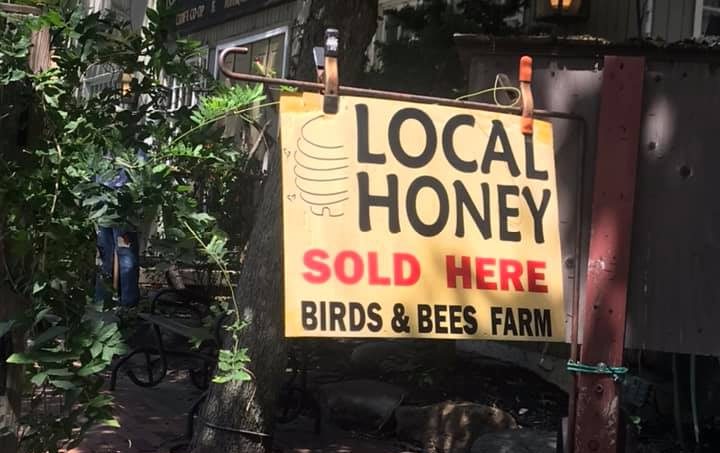
Thanks to Hugh and Debbie Pribell for contributing this guest blog post! You can learn more about them as well as contact them on their My Honey Crate Listing.
The opinions expressed in this post are those of the authors. They do not necessarily reflect the opinions or views of My Honey Crate or its members.
